Critical Analysis of King Jr’s Psychosocial history
VerifiedAdded on 2022/08/25
|5
|1110
|27
AI Summary
Contribute Materials
Your contribution can guide someone’s learning journey. Share your
documents today.
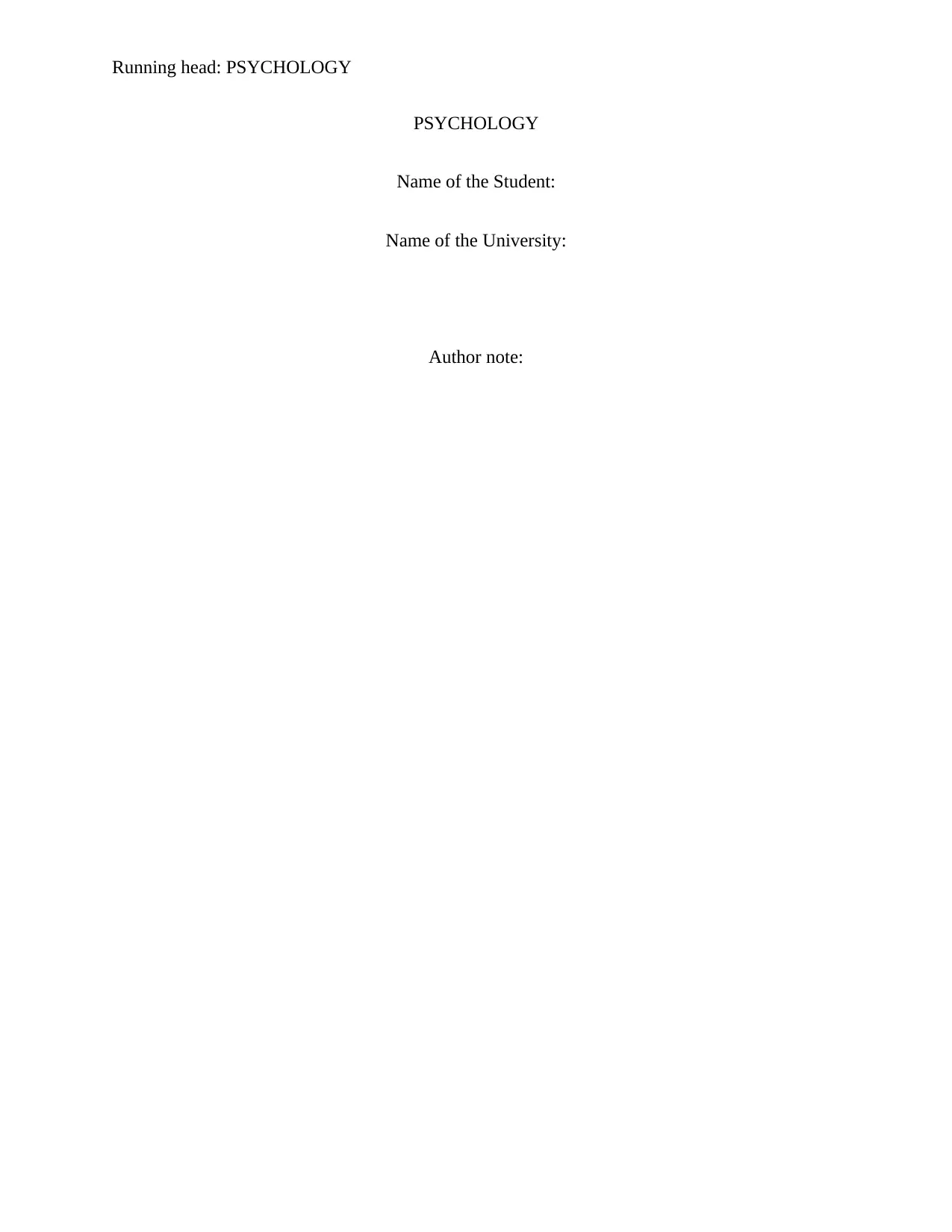
Running head: PSYCHOLOGY
PSYCHOLOGY
Name of the Student:
Name of the University:
Author note:
PSYCHOLOGY
Name of the Student:
Name of the University:
Author note:
Secure Best Marks with AI Grader
Need help grading? Try our AI Grader for instant feedback on your assignments.
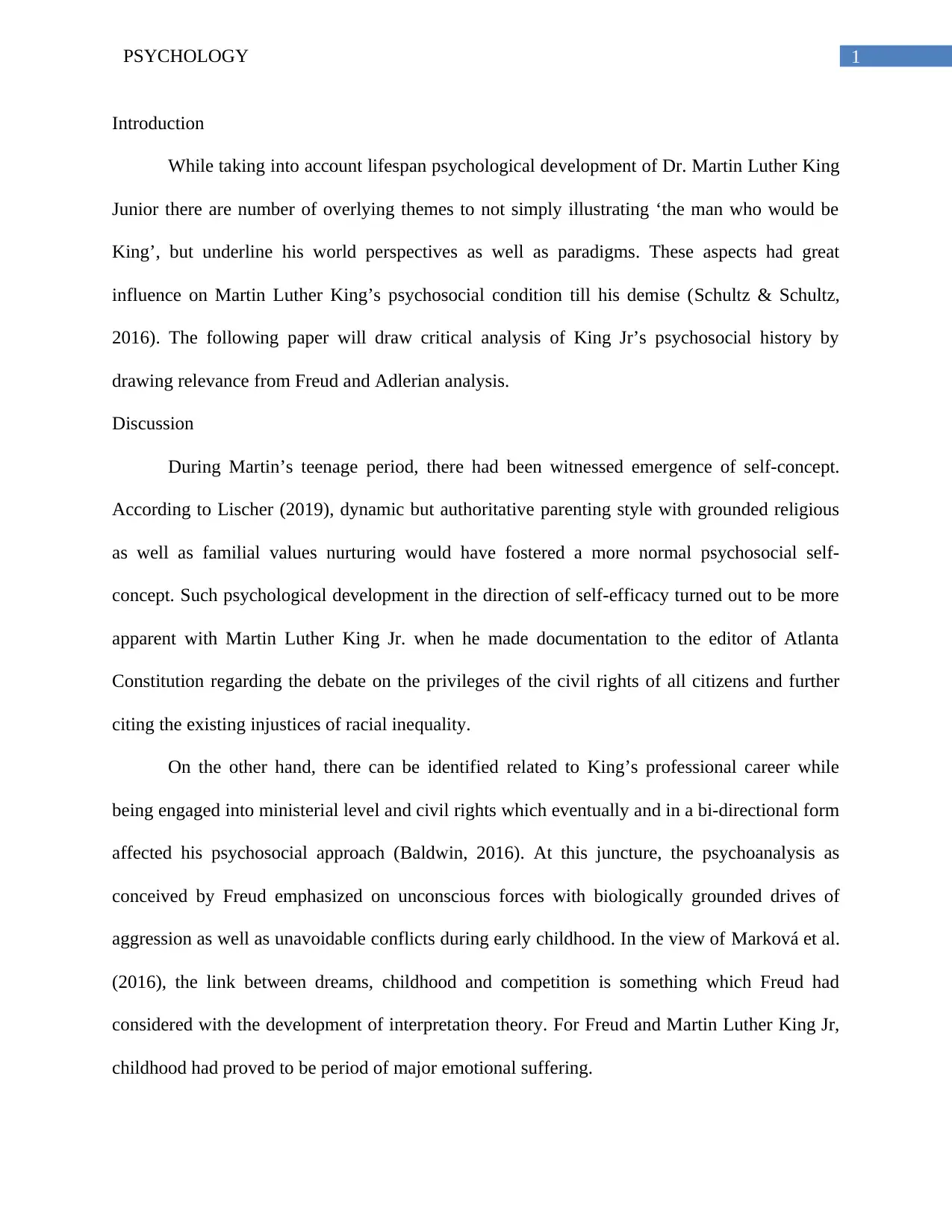
1PSYCHOLOGY
Introduction
While taking into account lifespan psychological development of Dr. Martin Luther King
Junior there are number of overlying themes to not simply illustrating ‘the man who would be
King’, but underline his world perspectives as well as paradigms. These aspects had great
influence on Martin Luther King’s psychosocial condition till his demise (Schultz & Schultz,
2016). The following paper will draw critical analysis of King Jr’s psychosocial history by
drawing relevance from Freud and Adlerian analysis.
Discussion
During Martin’s teenage period, there had been witnessed emergence of self-concept.
According to Lischer (2019), dynamic but authoritative parenting style with grounded religious
as well as familial values nurturing would have fostered a more normal psychosocial self-
concept. Such psychological development in the direction of self-efficacy turned out to be more
apparent with Martin Luther King Jr. when he made documentation to the editor of Atlanta
Constitution regarding the debate on the privileges of the civil rights of all citizens and further
citing the existing injustices of racial inequality.
On the other hand, there can be identified related to King’s professional career while
being engaged into ministerial level and civil rights which eventually and in a bi-directional form
affected his psychosocial approach (Baldwin, 2016). At this juncture, the psychoanalysis as
conceived by Freud emphasized on unconscious forces with biologically grounded drives of
aggression as well as unavoidable conflicts during early childhood. In the view of Marková et al.
(2016), the link between dreams, childhood and competition is something which Freud had
considered with the development of interpretation theory. For Freud and Martin Luther King Jr,
childhood had proved to be period of major emotional suffering.
Introduction
While taking into account lifespan psychological development of Dr. Martin Luther King
Junior there are number of overlying themes to not simply illustrating ‘the man who would be
King’, but underline his world perspectives as well as paradigms. These aspects had great
influence on Martin Luther King’s psychosocial condition till his demise (Schultz & Schultz,
2016). The following paper will draw critical analysis of King Jr’s psychosocial history by
drawing relevance from Freud and Adlerian analysis.
Discussion
During Martin’s teenage period, there had been witnessed emergence of self-concept.
According to Lischer (2019), dynamic but authoritative parenting style with grounded religious
as well as familial values nurturing would have fostered a more normal psychosocial self-
concept. Such psychological development in the direction of self-efficacy turned out to be more
apparent with Martin Luther King Jr. when he made documentation to the editor of Atlanta
Constitution regarding the debate on the privileges of the civil rights of all citizens and further
citing the existing injustices of racial inequality.
On the other hand, there can be identified related to King’s professional career while
being engaged into ministerial level and civil rights which eventually and in a bi-directional form
affected his psychosocial approach (Baldwin, 2016). At this juncture, the psychoanalysis as
conceived by Freud emphasized on unconscious forces with biologically grounded drives of
aggression as well as unavoidable conflicts during early childhood. In the view of Marková et al.
(2016), the link between dreams, childhood and competition is something which Freud had
considered with the development of interpretation theory. For Freud and Martin Luther King Jr,
childhood had proved to be period of major emotional suffering.
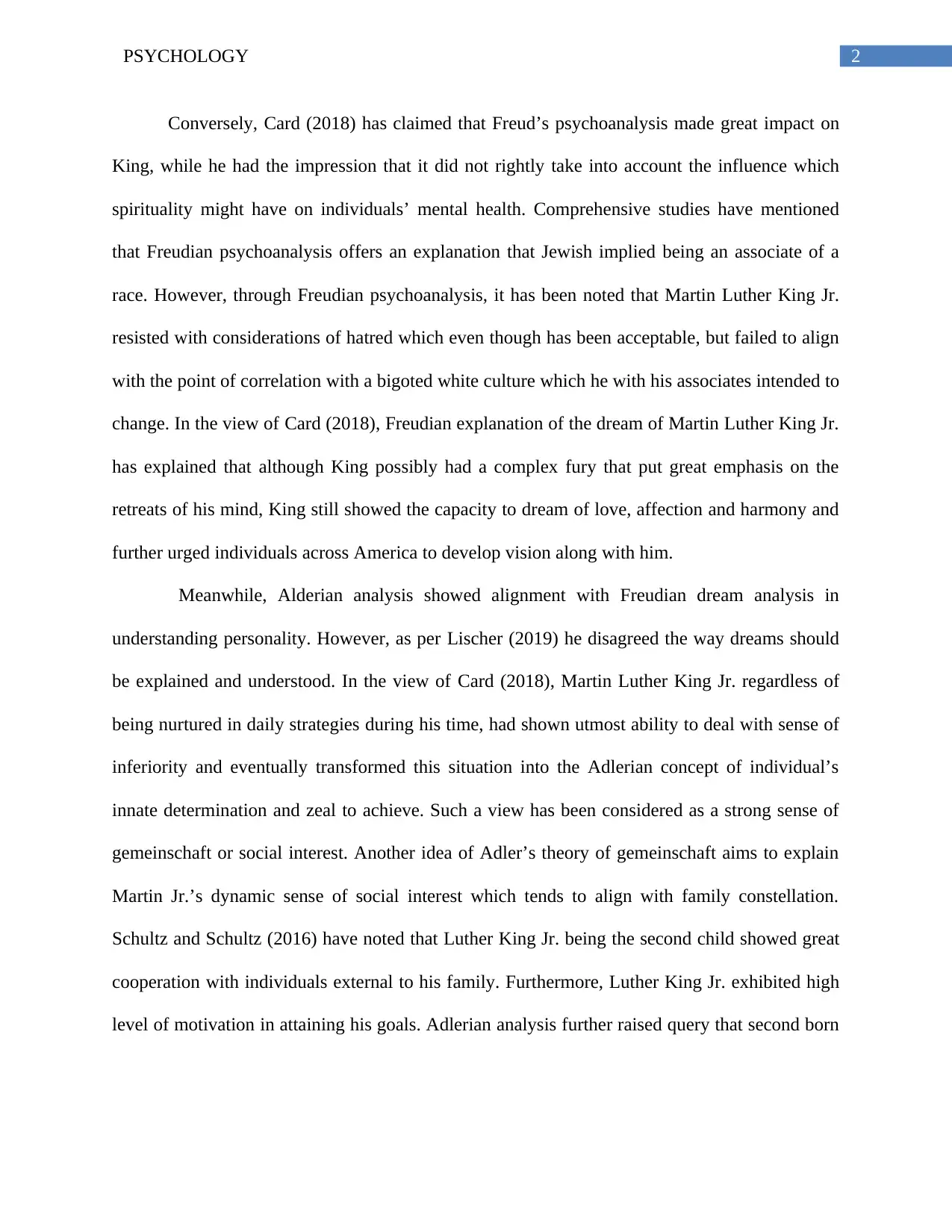
2PSYCHOLOGY
Conversely, Card (2018) has claimed that Freud’s psychoanalysis made great impact on
King, while he had the impression that it did not rightly take into account the influence which
spirituality might have on individuals’ mental health. Comprehensive studies have mentioned
that Freudian psychoanalysis offers an explanation that Jewish implied being an associate of a
race. However, through Freudian psychoanalysis, it has been noted that Martin Luther King Jr.
resisted with considerations of hatred which even though has been acceptable, but failed to align
with the point of correlation with a bigoted white culture which he with his associates intended to
change. In the view of Card (2018), Freudian explanation of the dream of Martin Luther King Jr.
has explained that although King possibly had a complex fury that put great emphasis on the
retreats of his mind, King still showed the capacity to dream of love, affection and harmony and
further urged individuals across America to develop vision along with him.
Meanwhile, Alderian analysis showed alignment with Freudian dream analysis in
understanding personality. However, as per Lischer (2019) he disagreed the way dreams should
be explained and understood. In the view of Card (2018), Martin Luther King Jr. regardless of
being nurtured in daily strategies during his time, had shown utmost ability to deal with sense of
inferiority and eventually transformed this situation into the Adlerian concept of individual’s
innate determination and zeal to achieve. Such a view has been considered as a strong sense of
gemeinschaft or social interest. Another idea of Adler’s theory of gemeinschaft aims to explain
Martin Jr.’s dynamic sense of social interest which tends to align with family constellation.
Schultz and Schultz (2016) have noted that Luther King Jr. being the second child showed great
cooperation with individuals external to his family. Furthermore, Luther King Jr. exhibited high
level of motivation in attaining his goals. Adlerian analysis further raised query that second born
Conversely, Card (2018) has claimed that Freud’s psychoanalysis made great impact on
King, while he had the impression that it did not rightly take into account the influence which
spirituality might have on individuals’ mental health. Comprehensive studies have mentioned
that Freudian psychoanalysis offers an explanation that Jewish implied being an associate of a
race. However, through Freudian psychoanalysis, it has been noted that Martin Luther King Jr.
resisted with considerations of hatred which even though has been acceptable, but failed to align
with the point of correlation with a bigoted white culture which he with his associates intended to
change. In the view of Card (2018), Freudian explanation of the dream of Martin Luther King Jr.
has explained that although King possibly had a complex fury that put great emphasis on the
retreats of his mind, King still showed the capacity to dream of love, affection and harmony and
further urged individuals across America to develop vision along with him.
Meanwhile, Alderian analysis showed alignment with Freudian dream analysis in
understanding personality. However, as per Lischer (2019) he disagreed the way dreams should
be explained and understood. In the view of Card (2018), Martin Luther King Jr. regardless of
being nurtured in daily strategies during his time, had shown utmost ability to deal with sense of
inferiority and eventually transformed this situation into the Adlerian concept of individual’s
innate determination and zeal to achieve. Such a view has been considered as a strong sense of
gemeinschaft or social interest. Another idea of Adler’s theory of gemeinschaft aims to explain
Martin Jr.’s dynamic sense of social interest which tends to align with family constellation.
Schultz and Schultz (2016) have noted that Luther King Jr. being the second child showed great
cooperation with individuals external to his family. Furthermore, Luther King Jr. exhibited high
level of motivation in attaining his goals. Adlerian analysis further raised query that second born
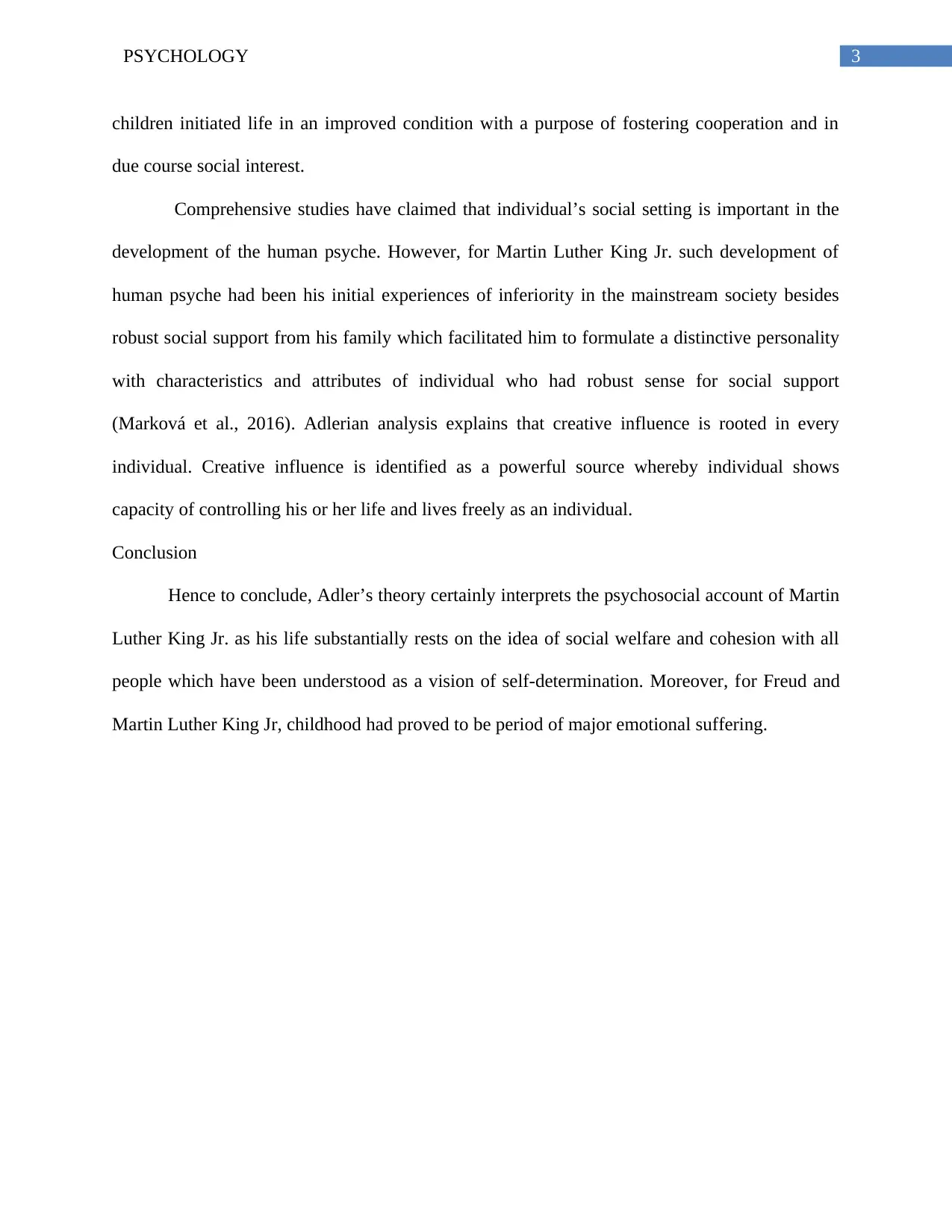
3PSYCHOLOGY
children initiated life in an improved condition with a purpose of fostering cooperation and in
due course social interest.
Comprehensive studies have claimed that individual’s social setting is important in the
development of the human psyche. However, for Martin Luther King Jr. such development of
human psyche had been his initial experiences of inferiority in the mainstream society besides
robust social support from his family which facilitated him to formulate a distinctive personality
with characteristics and attributes of individual who had robust sense for social support
(Marková et al., 2016). Adlerian analysis explains that creative influence is rooted in every
individual. Creative influence is identified as a powerful source whereby individual shows
capacity of controlling his or her life and lives freely as an individual.
Conclusion
Hence to conclude, Adler’s theory certainly interprets the psychosocial account of Martin
Luther King Jr. as his life substantially rests on the idea of social welfare and cohesion with all
people which have been understood as a vision of self-determination. Moreover, for Freud and
Martin Luther King Jr, childhood had proved to be period of major emotional suffering.
children initiated life in an improved condition with a purpose of fostering cooperation and in
due course social interest.
Comprehensive studies have claimed that individual’s social setting is important in the
development of the human psyche. However, for Martin Luther King Jr. such development of
human psyche had been his initial experiences of inferiority in the mainstream society besides
robust social support from his family which facilitated him to formulate a distinctive personality
with characteristics and attributes of individual who had robust sense for social support
(Marková et al., 2016). Adlerian analysis explains that creative influence is rooted in every
individual. Creative influence is identified as a powerful source whereby individual shows
capacity of controlling his or her life and lives freely as an individual.
Conclusion
Hence to conclude, Adler’s theory certainly interprets the psychosocial account of Martin
Luther King Jr. as his life substantially rests on the idea of social welfare and cohesion with all
people which have been understood as a vision of self-determination. Moreover, for Freud and
Martin Luther King Jr, childhood had proved to be period of major emotional suffering.
Secure Best Marks with AI Grader
Need help grading? Try our AI Grader for instant feedback on your assignments.
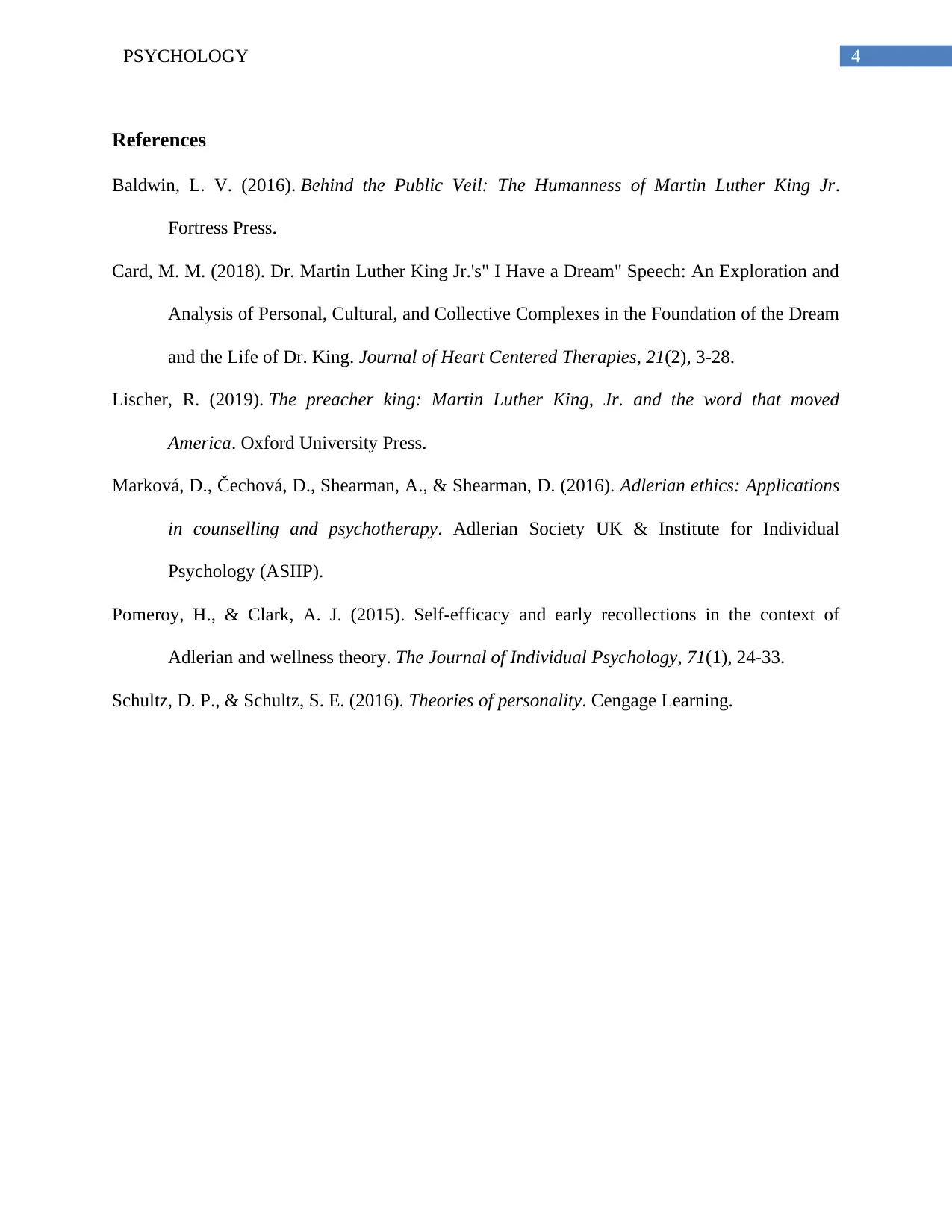
4PSYCHOLOGY
References
Baldwin, L. V. (2016). Behind the Public Veil: The Humanness of Martin Luther King Jr.
Fortress Press.
Card, M. M. (2018). Dr. Martin Luther King Jr.'s" I Have a Dream" Speech: An Exploration and
Analysis of Personal, Cultural, and Collective Complexes in the Foundation of the Dream
and the Life of Dr. King. Journal of Heart Centered Therapies, 21(2), 3-28.
Lischer, R. (2019). The preacher king: Martin Luther King, Jr. and the word that moved
America. Oxford University Press.
Marková, D., Čechová, D., Shearman, A., & Shearman, D. (2016). Adlerian ethics: Applications
in counselling and psychotherapy. Adlerian Society UK & Institute for Individual
Psychology (ASIIP).
Pomeroy, H., & Clark, A. J. (2015). Self-efficacy and early recollections in the context of
Adlerian and wellness theory. The Journal of Individual Psychology, 71(1), 24-33.
Schultz, D. P., & Schultz, S. E. (2016). Theories of personality. Cengage Learning.
References
Baldwin, L. V. (2016). Behind the Public Veil: The Humanness of Martin Luther King Jr.
Fortress Press.
Card, M. M. (2018). Dr. Martin Luther King Jr.'s" I Have a Dream" Speech: An Exploration and
Analysis of Personal, Cultural, and Collective Complexes in the Foundation of the Dream
and the Life of Dr. King. Journal of Heart Centered Therapies, 21(2), 3-28.
Lischer, R. (2019). The preacher king: Martin Luther King, Jr. and the word that moved
America. Oxford University Press.
Marková, D., Čechová, D., Shearman, A., & Shearman, D. (2016). Adlerian ethics: Applications
in counselling and psychotherapy. Adlerian Society UK & Institute for Individual
Psychology (ASIIP).
Pomeroy, H., & Clark, A. J. (2015). Self-efficacy and early recollections in the context of
Adlerian and wellness theory. The Journal of Individual Psychology, 71(1), 24-33.
Schultz, D. P., & Schultz, S. E. (2016). Theories of personality. Cengage Learning.
1 out of 5
Your All-in-One AI-Powered Toolkit for Academic Success.
+13062052269
info@desklib.com
Available 24*7 on WhatsApp / Email
![[object Object]](/_next/static/media/star-bottom.7253800d.svg)
Unlock your academic potential
© 2024 | Zucol Services PVT LTD | All rights reserved.